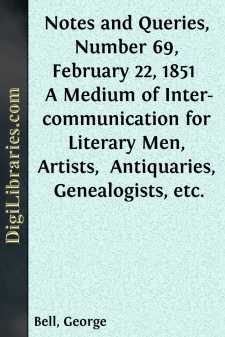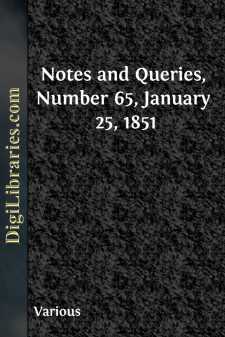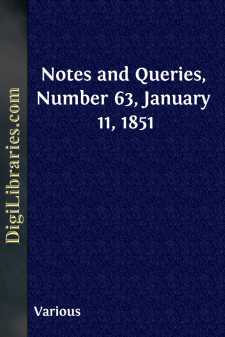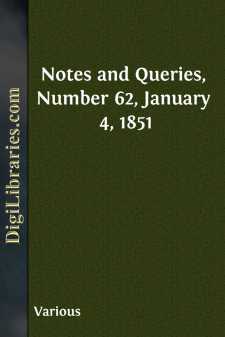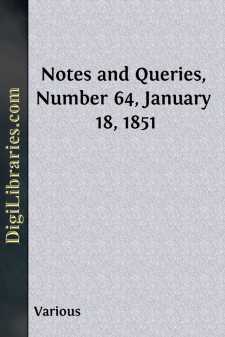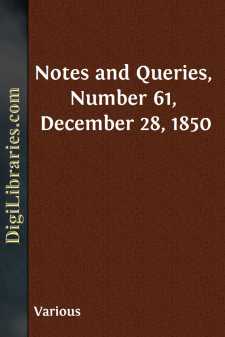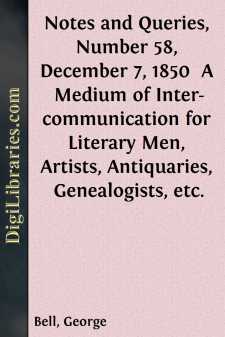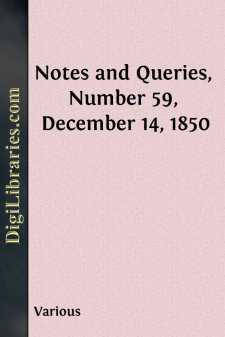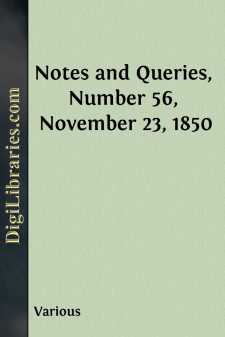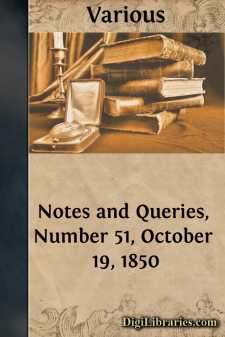Periodicals
- Art 27
- Children's periodicals 59
- Entertainment 5
- Food/Wine 2
- Games/Humor 455
- General
- Health 1
- History 53
- House/Home 1
- Regional 62
- Science/Nature 118
- Transportation 10
General Books
Sort by:
by:
George Bell
THE ROLLIAD. (22d Ed., 1812.) Finding that my copy of The Rolliad ("Notes and Queries," Vol. ii., p. 373.) contains fuller information regarding the authors than has yet appeared in your valuable periodical, I forward you a transcript of the MS. notes, most of which are certified by the initial of Dr Lawrence, from whose copy all of them were taken by the individual who gave me the volume. W....
more...
by:
Various
NOTES. TRADITIONAL ENGLISH BALLADS. The task of gathering old traditionary song is surely a pleasant and a lightsome one. Albeit the harvest has been plentiful and the gleaners many, still a stray sheaf may occasionally be found worth the having. But we must be careful not to "pick up a straw." One of your corespondents recommends, as an addition to the value of your pages, the careful getting...
more...
by:
Various
NOTES. THE BREECHES, OR GENEVA BIBLE. Of this, the most popular edition of the Scriptures in the reign of Queen Elizabeth, we meet continually with erroneous opinions of its rarity, and also of its value, which the following brief statement may tend in a degree to correct. The translation was undertaken by certain reformers who fled to Geneva during the reign of Queen Mary; and is attributed to W....
more...
by:
Various
NOTES. OLD BALLAD UPON THE "WINTER'S TALE." Some of your correspondents may be able to give me information respecting an old ballad that has very recently fallen in my way, on a story similar to that of Shakspeare's Winter's Tale, and in some particulars still more like Greene's novel of Pandosto, upon which the Winter's Tale was founded. You are aware that the earliest...
more...
by:
Various
NOTES. AUTHORSHIP OF HENRY VIII. In my last communication on the subject of Henry VIII., I referred to certain characteristic tricks of Fletcher's style of frequent occurrence in that play, and I now beg leave to furnish you with a few instances. I wish it, however, to be understood, that I advance these merely as illustrative specimens selected at random; as there is scarcely a line of the...
more...
by:
Various
NOTES. ILLUSTRATIONS OF SCOTTISH BALLADS. In the ballad of "Annan Water" (Border Minstrelsy, vol. iii.) is the following verse:— "O he has pour'd aff his dapperpy coat, The silver buttons glanced bonny; The waistcoat bursted aff his breast, He was sae full of melancholy." A very unexpected effect of sorrow, but one that does not seem to be unprecedented. "A plague of sighing...
more...
by:
George Bell
FURTHER NOTES ON THE HIPPOPOTAMUS. The following remarks are supplementary to a note on the hippopotamus in Vol. ii, p. 35. In that note the exhibition of the hippopotamus at the Roman games is not traced lower than the time of the Emperor Commodus. Helagabalus, however, 218-22 A.D., had hippopotami among the various rare animals which he displayed in public as a part of his state. (Lamprid. c. 28) A...
more...
by:
Various
NOTES. THE FIRST PAPER-MILL IN ENGLAND. In the year 1588, a paper-mill was established at Dartford, in Kent, by John Spilman, "jeweller to the Queen." The particulars of this mill are recorded in a poem by Thomas Churchyard, published shortly after its foundation, under the following title:— "A description and playne discourse of paper, and the whole benefits that paper brings, with...
more...
by:
Various
NOTES. THE OLDENBURG HORN. The highly interesting collection of pictures at Combe Abbey, the seat of the Earl of Craven, in Warwickshire, was, for the most part, bequeathed by Elizabeth, Queen of Bohemia, the daughter of James I., to her faithful attendant, William, Earl of Craven. The collection has remained, entire and undisturbed, up to the present time. Near the upper end of the long gallery is a...
more...
by:
Various
NOTES. ROBERD THE ROBBER. In the Vision of Piers Ploughman are two remarkable passages in which mention is made of "Roberd the robber," and of "Roberdes knaves." "Roberd the robbere, On Reddite loked, And for ther was noght wherof He wepte swithe soore." Wright's ed., vol. i. p. 105. "In glotonye, God woot, Go thei to bedde, And risen with ribaudie, The Roberdes...
more...


